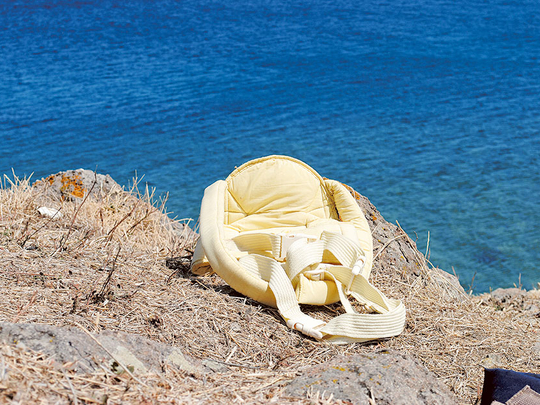
Bodrum, Turkey:
Samir is on to a good thing. He has a handy gig going five days — or nights, because he’s hard to pin down — a week running the reception desk of this Turkish art deco hotel that has definitely seen better days.
But Samir has had better days since he moved here from Jordan a year ago.
He’s a fixer.
Want a driver? He’s your man. A ticket for a ferry to Greece? No problem. Pay in euros, Turkish lira or US dollars? Mafi mushkila.
He may not be the fastest when it comes to getting your passport scanned, but he’s far from slow when it comes to the Syrians staying in the hotel. What ever you want he can fix, and it likely explains why it appears he’s always in an intense conversation on his white ear buds plugged into an iPhone 6 and if you talk to him in person, you’re interrupting a business deal of great importance. “Sure, there’s five Syrian families here. Two families are moving out tonight,” Samir offers with a wink-wink, nudge-nudge, say no more look that says everything that Gulf News needs to know.
They’re not moving back to Damascus or Aleppo, are they?
“Yanni,” he says smiling. “They’re moving on.”
On?
“Walahi,” he says. “On. You know. On.”
It’s from here that 50,000 other migrants have moved on, as in on to the Greek island of Kos.
There, the migrants are in Europe, as in the European Union.
Here, in Bodrum, while it’s geographically Europe because you’re on the western side of the River Bosporous, it doesn’t count.
This is where history, geography, politics and economics all collide.
All of the migrants here are as close as you can get to the promised land of Europe — you can even see the mountainous cliffs of Kos rise up to the west just seven kilometres away.
“Go to the bus station,” Samir says, surreptitiously sliding over a phone number on a yellow sticky note. “Talk to him.”
“Him” is Dutch, tall, with face fuzz that might grow into a beard one day. But right now, ‘Him’ is busy working two old-model Nokia phones and dealing with several groups of people, all of whom have his number.
“What do you want to know?” he says. Behind him are four beefier men, apparently Arabic, and one with a white Band-Aid strip across his nose and freshly healing scrapes down his right cheek.
“It’s ₤500,” he says, very clipped in an accent that leaves little room for compromise.
It is a take it or leave it, all or nothing, life and death offer for a trip crammed together with others bound together by war, the Arab Spring, or just sheer desperation, sitting on the side of grey rigid inflatable boat powered by a 50 CC Honda outboard engine.
If you’re in, you travel by a windowless blue van out to a secluded headland, waiting for dawn to break. From there, in the first streams of daylight in the east, Kos looms large to the west — in Europe.
During the day, the beaches and resorts all the way from Bodrum out to Akyarlar are crowded with tourists from Europe who soak up the sun and the suds on the shores of the Mediterranean. Just how much would the Dutchman get if he could fill the yachts and the tourist boats they use and booze it up for pleasures for just a quick trip of his human cargo across the five kilometres to Kos?
There’s a little island — it’s hardly an acre large — about a hundred metres off shore. When Gulf News visited, there were three luminous orange life vests on the rocky beach, cast aside by the Dutchman’s customers for what ever reason in what ever hurry. Time is money, and there’s money to be made. And there’s no time like the present.
It’s here on a boulder-covered headland, where the grass is dry and littered with broken bottles and the discarded remnant lives lived in Damascus, Deraa and Dhaka, that the dream becomes true, or the nightmares of tossed boats and swamping waves haunt the living to their deaths under the sea.
“Six died on Wednesday night,” Samir says knowingly. “There were two children and four others when a boat flipped.”
According to Frontex, the European border agency charged with turning back this frightful tide of human flotsam, 160,000 made it to Europe in July. That’s three times more than made it in July last year.
The bus station in central Bodrum is rammed. A Turkish ice cream vendor is rattling and banging out his wares. Few are buying. At a table, five young Syrian men are savouring a round of teas served in glasses. Who knows what’s on for their next course of action?
There are three children, all appear to be under 10, hanging by a scarved mother’s side as she watches over two tattered suitcases and a laundry bag that is months from ever seeing a washing machine.
The man with the Band-Aid on his nose is talking to her, exchanging contacts.
When the grey rubber boats leave in the morning from the headland of Akyarlar, she’ll be there. And maybe on the other side too. That’s €2,000 for the Dutchman. Samir is still talking on the iPhone 6. Business has never been better.












